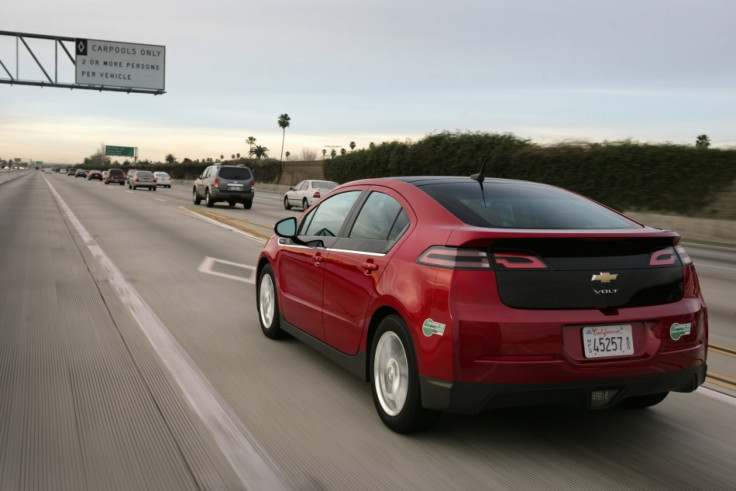Chevy Volt: Coming to a California HOV Carpool Lane Near You Next Week

General Motors Co. said Thursday it has begun shipping low-emission Chevrolet Volt models to California that qualify for a $1,500 state rebate and allow drivers to travel in the state's carpool lanes.
GM expects the new qualifications to boost sales of the Volt in its most important market, and the company will soon begin an advertising and marketing blitz both to increase sales and further restore the image of its much-maligned hybrid-electric vehicle.
This week, Republican presidential candidate Newt Gingrich labeled the Volt an Obama car, in a criticism of President Barack Obama and the U.S. government bailouts of GM and Chrysler Group LLC. Earlier this year, the Volt was investigated by the National Highway Traffic Safety Administration after crash tests led to battery fires. This also produced a testy congressional hearing highly divided along political lines.
GM spokesman Shad Blach said the company will attempt to move past political theater in the coming months. The Volt will be eligible for carpool lanes in California beginning March 1.
We're going to do a big push between now and the summertime to get beyond the political antics that occurred with the Volt at the end of last year and beginning of this year with the battery investigations, Blach said. We're going to focus now on the real value proposition of the car.
That value proposition could mean up to $9,000 in rebates. But that's still a figure that will scare a lot of potential buyers, and analysts said the Volt's introduction to California's carpool lanes is only one step toward meeting GM's lofty goals.
GM had forecast sales of 60,000 Volts for 2012 before revising its prediction earlier this year. The company has not set a specific goal, but said it no longer expected to meet its original goal.
LMC Automotive's sales forecast for the Volt stands around 30,000. Michael Omotoso, an analyst at LMC Automotive, said the company could increase that when it revises its forecast next month. He said the changes, plus some additional factors, could mean a 5 percent growth in sales -- about 1,500 units.
Gas prices are higher than they have been in a while, Omotoso said in a phone interview. The combination of the HOV [high-occupancy vehicle] lane access and higher gas prices could help boost sales of the Volt not just in California but across the entire country.
Drivers using the congested freeway lanes can save up to 36 minutes a day in carpool lanes -- a third of their total commute, GM said. The low-emission Volt will kick in a $1,500 state rebate in addition to an existing $7,500 tax credit.
Blach said the clean air stickers that will now be available for the Volt can increase the resale value of a vehicle by as much as $3,000 to $4,000 in California.
Based on customer feedback and the waiting lists we have for these particular cars, there already is some demand before the cars even hit the showrooms. We know that it's going to increase sales. We've heard from customers who have held off buying a Volt until the sticker program came into effect. We expect sales to increase dramatically.
But skepticism remains as to whether the Volt can recover from a 2011 which saw it fall 2,500 sales short of GM's intended 10,000 target and make a dent in the market.
One of its biggest competitors, in fact, sits right next to it in many GM and Chevrolet showrooms. That would be the Chevy Cruze, which is roughly the same size as the Volt.
One area in which they remain far apart, though? Price. Even after credits and rebates in California, a Volt still costs customers about $31,000. Compare that with around $20,000 for the Cruze, a vehicle that averages 40 miles per gallon.
When you walk into a Chevy dealership and see the cars side by side, even though the Volt may be the vehicle that made you walk in in the first place, people think, 'Maybe I should buy the cheaper vehicle,' Omotoso said.
Other challenges, he added, come from small, increasingly efficient compacts like Ford Motor Co.'s Fiesta and Hyundai Motor Co.'s Elantra.
And there's also some lingering political resentment from consumers, Omotoso said, though that has been difficult to quantify. But some consumers have expressed an unwillingness to buy a vehicle from a company that received taxpayer money in 2008 and 2009 bailouts, implemented by the administrations of both Presidents George W. Bush and Barack Obama.
Said Omotoso of the Volt's new perks in California: It's a step in the right direction.
© Copyright IBTimes 2024. All rights reserved.











